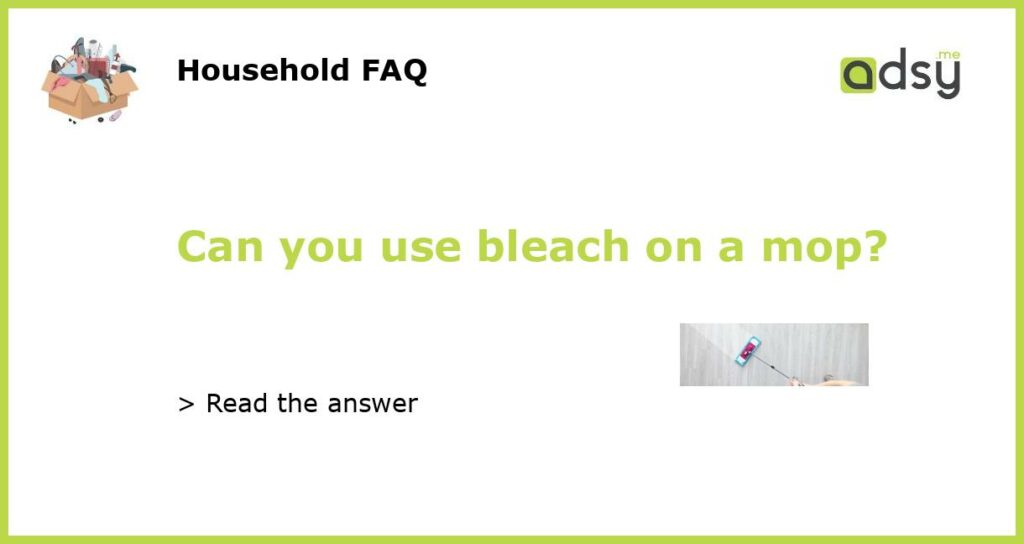Can bleach be used on a mop?
Using bleach on a mop can be an effective way to clean and disinfect your floors. Bleach is known for its strong antimicrobial properties, which can help eliminate germs and bacteria. However, it is essential to use bleach properly and take precautions to avoid damaging your mop or creating a hazardous environment.
Steps to safely use bleach on a mop
Here are some steps you can follow to safely use bleach on a mop:
1. Dilute the bleach: It is important to dilute bleach before using it on your mop. Most household bleach products recommend diluting them with water before use. Follow the instructions on the bleach bottle to determine the appropriate ratio of bleach to water.
2. Test a small area: Before using bleach on the entire mop, test it on a small, inconspicuous area of your floor or mop head. This will help you determine if the bleach will cause any discoloration or damage.
3. Rinse the mop thoroughly: Before using the mop, make sure to rinse it thoroughly to remove any dirt or debris. This will ensure that the bleach is not contaminated and will be more effective in killing bacteria and germs.
4. Apply the bleach solution: Once the mop is rinsed, apply the diluted bleach solution to the mop head. You can either pour the solution directly onto the mop or use a spray bottle to spray it evenly.
5. Clean the floors: Start mopping the floors as usual, making sure to cover the entire area. Pay extra attention to high-touch areas and spots that require extra disinfection.
Precautions to take when using bleach on a mop
While bleach can be an effective cleaning agent, it is important to take certain precautions when using it on a mop:
1. Protect your skin and eyes: Bleach can be harsh on your skin and eyes, so it is important to wear gloves and protective eyewear when handling bleach. Avoid direct contact with the bleach solution.
2. Ventilate the area: Bleach fumes can be harmful if inhaled in large quantities. Ensure that the area where you are using bleach is well-ventilated by opening windows or using fans.
3. Avoid mixing bleach with other chemicals: Mixing bleach with other chemicals, such as ammonia or vinegar, can produce toxic fumes. It is important to only use bleach on its own and follow the instructions on the product label.
4. Follow manufacturer’s instructions: Each brand of bleach may have specific instructions for use. It is important to read and follow the manufacturer’s instructions to ensure safe and effective use.
Alternatives to using bleach on a mop
If you prefer not to use bleach or are looking for alternatives, there are other options to consider:
1. Vinegar: Vinegar is a natural disinfectant that can be used to clean floors. It is effective against many types of bacteria and viruses. However, it is important to note that vinegar should not be used on certain surfaces, such as marble or stone.
2. Hydrogen peroxide: Hydrogen peroxide is another disinfectant that can be used to clean floors. It is less harsh than bleach and does not produce toxic fumes. However, it may not be as effective against certain types of bacteria or viruses.
3. Steam cleaning: Steam cleaning is a chemical-free method of cleaning and disinfecting floors. It uses hot steam to kill germs and bacteria. Steam mops are widely available and can be a great alternative to traditional mops.
When to avoid using bleach on a mop
While bleach can be a useful cleaning agent, there are certain situations where it may be best to avoid using it on a mop:
1. Delicate surfaces: Bleach can be too harsh for delicate surfaces such as wood or laminate. It can cause discoloration or damage, so it is best to use milder cleaning agents on these surfaces.
2. Allergies or sensitivities: Some individuals may have allergies or sensitivities to bleach or its fumes. In such cases, it is best to choose alternative cleaning agents that are less likely to cause a reaction.
3. Regular maintenance cleaning: If you are performing regular maintenance cleaning and not specifically targeting disinfection, using bleach may not be necessary. In such cases, a regular cleaning solution or detergent may be sufficient.
4. Other disinfection methods: If you are looking for alternative methods of disinfection, such as using UV light or chemical-free solutions, bleach may not be the best choice. It is important to consider your specific needs and preferences when choosing a cleaning method.






